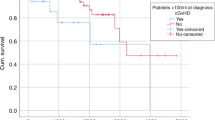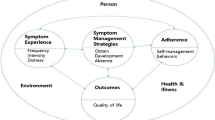Abstract
Much research into the impact of hematopoietic cell transplantation (HCT) on recipients’ symptoms, functioning and health-related quality of life uses diverse patient-reported outcome (PRO) measures. Robust conclusions regarding PROs in HCT patients are constrained by methodological issues, including the use of multiple different and noncomparable assessment measures. We reviewed 114 publications addressing PROs in HCT patients. Although three multi-item measures were most frequently used (FACT-BMT, n=28; European Organization for Research and Treatment of Cancer Quality of Life Questionnaire-C30, n=26; and SF-36, n=26), 25 additional measures were used in more than one study. Another 50 measures were used in single studies. Over 50% of studies used more than one measure. We recommend that the field agrees upon a set of measures to address the core domains important to patients, to reduce heterogeneity and allow comparisons across studies and between different populations. Measures should be available in a free and easily accessible manner internationally. We discuss the relative benefits of the National Institutes of Health-supported Patient-Reported Outcomes Measurement Information System (PROMIS) system to achieve these goals. To further address these issues, the Blood and Marrow Transplant Clinical Trials Network has recently created a task force to implement PROMIS measures alongside traditional PRO measures in future clinical trials. Robust comparisons between measures in this setting may allow for the development of a standard for HCT patients.
This is a preview of subscription content, access via your institution
Access options
Subscribe to this journal
Receive 12 print issues and online access
$259.00 per year
only $21.58 per issue
Buy this article
- Purchase on Springer Link
- Instant access to full article PDF
Prices may be subject to local taxes which are calculated during checkout
Similar content being viewed by others
References
Outcomes of cancer treatment for technology assessment and cancer treatment guidelines. American Society of Clinical Oncology. J Clin Oncol 1996; 14: 671–679.
Bevans M, Wiener L Health-Related Quality of Life in Adult and Pediatric Survivors of Hematopoietic Stem Cell Transplantation In: Savani BN (ed.). Blood and Marrow Transplantation Long-Term Management: Prevention and Complications. Wiley Blackwell: Chichester, UK: 2013; 345–367.
Hendriks MG, Schouten HC . Quality of life after stem cell transplantation: a patient, partner and physician perspective. Eur J Intern Med 2002; 13: 52–56.
Baca CB, Vickrey BG, Hays RD, Vassar SD, Berg AT . Differences in child versus parent reports of the child's health-related quality of life in children with epilepsy and healthy siblings. Value Health 2010; 13: 778–786.
Russell KM, Hudson M, Long A, Phipps S . Assessment of health-related quality of life in children with cancer: consistency and agreement between parent and child reports. Cancer 2006; 106: 2267–2274.
Detmar SB, Muller MJ, Schornagel JH, Wever LD, Aaronson NK . Health-related quality-of-life assessments and patient-physician communication: a randomized controlled trial. JAMA 2002; 288: 3027–3034.
Pidala J, Anasetti C, Jim H . Health-related quality of life following haematopoietic cell transplantation: patient education, evaluation and intervention. Br J Haematol 2009; 148: 373–385.
Lee SJ, Joffe S, Kim HT, Socie G, Gilman AL, Wingard JR et al. Physicians' attitudes about quality-of-life issues in hematopoietic stem cell transplantation. Blood 2004; 104: 2194–2200.
Pidala J, Anasetti C, Jim H . Quality of life after allogeneic hematopoietic cell transplantation. Blood 2009; 114: 7–19.
Braamse AM, Gerrits MM, van Meijel B, Visser O, Boenink AD, Cuijpers P et al. Predictors of health-related quality of life in patients treated with auto- and allo-SCT for hematological malignancies. Bone Marrow Transplant 2012; 47: 757–769.
Mosher CE, Redd WH, Rini CM, Burkhalter JE, DuHamel KN . Physical, psychological, and social sequelae following hematopoietic stem cell transplantation: a review of the literature. Psychooncology 2009; 18: 113–127.
Norkin M, Hsu JW, Wingard JR . Quality of life, social challenges, and psychosocial support for long-term survivors after allogeneic hematopoietic stem-cell transplantation. Semin Hematol 2012; 49: 104–109.
Garcia SF, Cella D, Clauser SB, Flynn KE, Lad T, Lai JS et al. Standardizing patient-reported outcomes assessment in cancer clinical trials: a patient-reported outcomes measurement information system initiative. J Clin Oncol 2007; 25: 5106–5112.
Kopp M, Schweigkofler H, Holzner B, Nachbaur D, Niederwieser D, Fleischhacker WW et al. EORTC QLQ-C30 and FACT-BMT for the measurement of quality of life in bone marrow transplant recipients: a comparison. Eur J Haematol 2000; 65: 97–103.
Estabrooks PA, Boyle M, Emmons KM, Glasgow RE, Hesse BW, Kaplan RM et al. Harmonized patient-reported data elements in the electronic health record: supporting meaningful use by primary care action on health behaviors and key psychosocial factors. J Am Med Inform Assoc 2012; 19: 575–582.
Bell DS, Kahn CE Jr . Health status assessment via the World Wide Web. Proc AMIA Annu Fall Symp 1996, 338–342.
Suh SY, Leblanc TW, Shelby RA, Samsa GP, Abernethy AP . Longitudinal patient-reported performance status assessment in the cancer clinic is feasible and prognostic. J Oncol Pract 2011; 7: 374–381.
Bush N, Donaldson G, Moinpour C, Haberman M, Mikkiken D, Markle V et al. Development, feasibility and compliance of a web-based system for very frequent QOL and symptom home self-assessment after hematopoietic stem cell transplantation. Qual Life Res 2005; 14: 77–93.
Wood WA, Deal AM, Abernethy A, Basch E, Battaglini C, Kim YH et al. Feasibility of frequent patient-reported outcome surveillance in patients undergoing hematopoietic cell transplantation. Biol Blood Marrow Transplant 2013; 19: 450–459.
Cella D, Yount S, Rothrock N, Gershon R, Cook K, Reeve B et al. The Patient-Reported Outcomes Measurement Information System (PROMIS): progress of an NIH roadmap cooperative group during its first two years. Med Care 2007; 45: S3–S11.
Wagner LI, Schink J, Bass M, Patel S, Diaz MV, Rothrock N et al. Bringing PROMIS to practice: brief and precise symptom screening in ambulatory cancer care. Cancer 2015; 121: 927–934.
Acknowledgements
Support for this study was provided by a grant to the BMT CTN: #U10HL069294 from the National Heart, Lung and Blood Institute and the National Cancer Institute, and the Health Resources and Services Administration Contract No. HHSH234200637020C. Dr Flynn was funded in part by the Research and Education Program Fund, a component of the Advancing a Healthier Wisconsin endowment at the Medical College of Wisconsin. Any views, opinions, findings, conclusions or recommendations expressed in this material are those of the author(s) and do not reflect the views or the official policy or position of the above mentioned parties.
Author information
Authors and Affiliations
Corresponding author
Ethics declarations
Competing interests
The authors declare no conflict of interest.
Rights and permissions
About this article
Cite this article
Shaw, B., Lee, S., Horowitz, M. et al. Can we agree on patient-reported outcome measures for assessing hematopoietic cell transplantation patients? A study from the CIBMTR and BMT CTN. Bone Marrow Transplant 51, 1173–1179 (2016). https://doi.org/10.1038/bmt.2016.113
Received:
Revised:
Accepted:
Published:
Issue Date:
DOI: https://doi.org/10.1038/bmt.2016.113
This article is cited by
-
Patient-reported outcomes in acute graft-versus-host disease: optimizing patient care and clinical trial endpoints
Bone Marrow Transplantation (2020)
-
Patients as experts: characterizing the most relevant patient-reported outcomes after hematopoietic cell transplantation
Bone Marrow Transplantation (2020)
-
Graft Versus Host Disease Clinical Trials: Is it Time for Patients Centered Outcomes to Be the Primary Objective?
Current Hematologic Malignancy Reports (2019)
-
Distress and quality of life in patient and caregiver dyads facing stem cell transplant: identifying overlap and unique contributions
Supportive Care in Cancer (2019)



